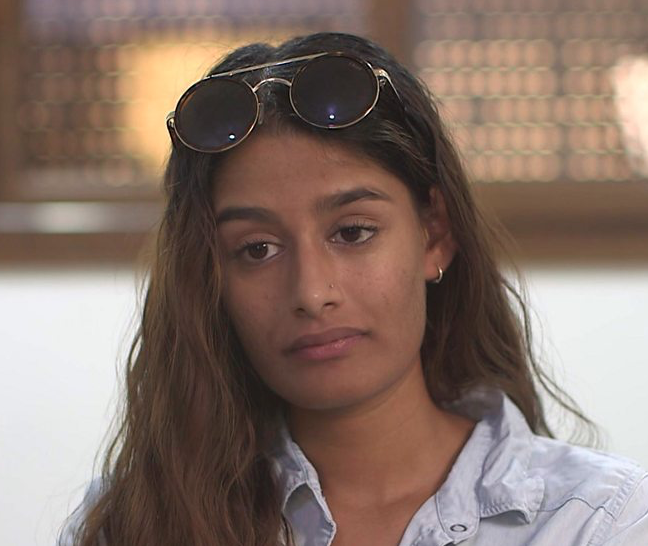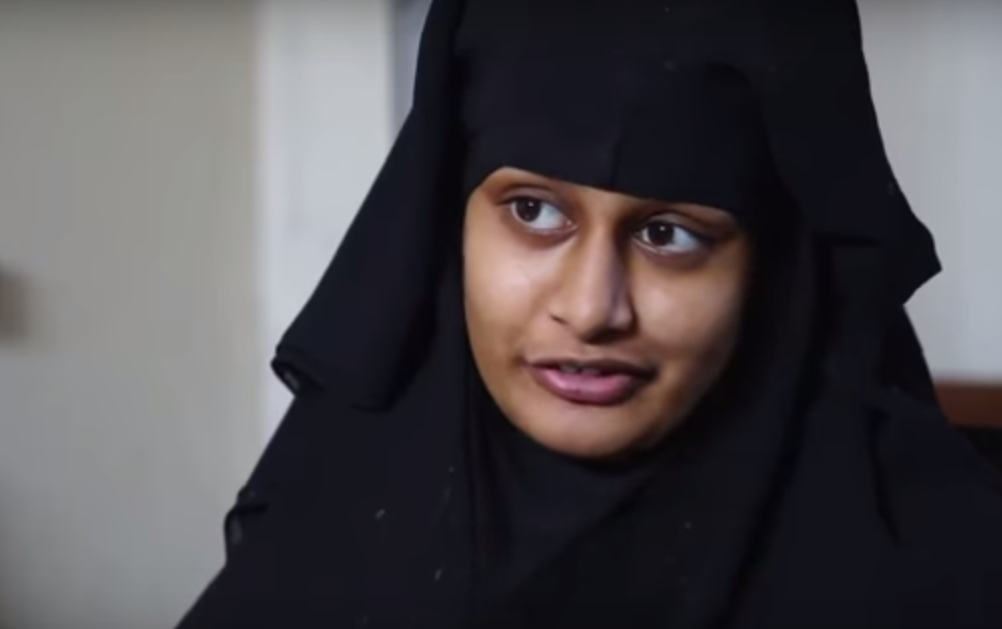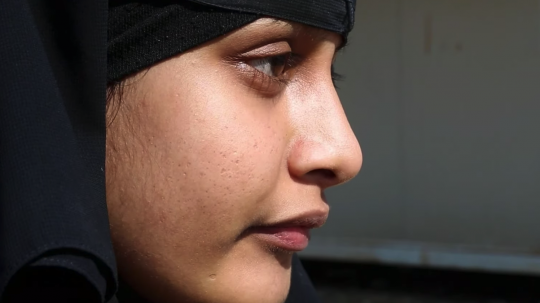Last week the Special Immigration Appeals Commission ruled that Sajid Javid’s decision to revoke Shamima Begum’s citizenship in 2019 was lawful, despite “credible suspicion” that she was trafficked to Syria by terror group Islamic State (Isis) for sexual exploitation, and rejected Begum’s appeal against the decision. The ruling casts further doubt on 23-year-old Begum’s hopes of ever being reunited with her family in the UK.
How Shamima Begum became a figure of controversy
Shamima Begum is one of the ‘Bethnal Green trio’: a group of three east London schoolgirls who were radicalised online by Isis members, and travelled through Turkey to Syria to join the terror group. It’s been reported that Canadian spy Mohammed Al Rasheed facilitated their journey into Isis-controlled Syrian territory.
When they left London in 2015, Begum was 15 years old, and her friends Amira Abase and Kadiza Sultana were 15 and 16 years old respectively. It’s believed that Abase and Sultana died in Syria, but this has not been formally verified.
Like her two friends, Begum married an Isis fighter shortly after arriving in Raqqa, the capital of the Isis self-declared ‘caliphate’ in Syria. She was still 15 years old when the marriage took place. She went on to have three children, all of whom died as infants.
In a recent BBC documentary, Begum said her role under the Isis regime was to be a stay-at-home wife and mother, and she had no involvement in any terror attacks or fighting. She also said that her husband abused her.
The ’caliphate’ collapsed in 2019, and Begum was subsequently found at the Al-Hawl refugee camp in northern Syria. She was nine months pregnant with her third child. Then-home secretary Sajid Javid publicly revoked her UK citizenship shortly after she was discovered.
Begum’s case is critical for herself and her family, who fear that she will not survive the dangerous conditions at Al-Roj camp in northeast Syria, where she now lives. According to Human Rights Watch: “The dire conditions often amount to inhumane treatment and have reached the level of torture.”
Her case also has major implications for the right to a nationality under international human rights law, the legal protections available for child victims of trafficking, and the obligation of states to counter terrorist threats. Finally, Begum’s case is of great political and cultural interest, and has attracted significant media attention in the UK and internationally.
Why did Sajid Javid revoke Begum’s citizenship?
In February 2019, Sajid Javid publicly revoked Begum’s citizenship on ‘national security grounds’. Javid said that Begum travelled to Syria to align with Isis of her own free will, and continued to present a national security threat. He said he based his decision on the advice of intelligence services.
Does this mean Begum is now stateless?
Section 40 (4) of the British Nationality Act (1981) states that someone cannot be deprived of their citizenship if it would render them stateless. The UK has also ratified both the 1954 Convention relating to the Status of Stateless Persons and the 1961 Convention on the Reduction of Statelessness.
Javid claimed that revoking Begum’s UK citizenship would not render her stateless as her heritage entitled her to Bangladeshi citizenship. Begum has never been to Bangladesh, but she was born in the UK to Bangladeshi parents. In 2019, Bangladeshi officials made it clear that Begum is not a Bangladeshi citizen, and the country’s foreign minister said she could face the death penalty for involvement in terrorism if she travels to Bangladesh.
A Special Immigration Appeals Commission hearing in February 2020 found that Javid’s decision did not render Begum stateless. Begum’s legal representation and the government both produced expert witnesses with opposing views on how Bangladeshi citizenship is transmitted to children of Bangladeshi heritage born overseas, and the commission rejected Begum’s claim that she would be left stateless. Begum’s solicitor said: “The logic of the decision will appear baffling, accepting as it does the key underlying factual assessments of extreme danger and extreme unfairness and yet declining to provide any legal remedy.”
The commission did find that conditions in the Al Roj camp would amount to a breach of her right to protection from torture, inhuman or degrading treatment, but also found that she could not rely on this right, enshrined in the European Convention on Human Rights, as she was no longer a citizen of a European state.
Why can’t Begum challenge this in the UK?
In 2021, the Supreme Court ruled that Begum cannot return to the UK to challenge this decision, because she poses a security risk. However, Jonathan Hall KC, the Independent Reviewer of Terrorism Legislation, is due to give a speech next week stating that Begum (and other British women who joined Islamic State) should be allowed return home to the UK to fight their cases, noting that other western states are taking back former ISIS recruits.
Why the latest appeal failed
In the judgement, Mr Justice Jay accepted there was credible suspicion that Begum was “recruited, transferred and then harboured for the purpose of sexual exploitation”, but that this was insufficient for the commission to deem Javid’s decision unlawful. He wrote: “It is for the secretary of state to decide what is in the public interest … Reasonable people will profoundly disagree with the secretary of state, but that raises wider societal and political questions which it is not the role of this commission to address.”
The reality of being ‘stateless’
Stateless people are deprived of the fundamental rights and protections that a nationality would afford them. This means they have difficulty accessing basic rights such as education, healthcare, employment and freedom of movement. Nationality also provides people with a sense of identity and belonging, and the enjoyment of state protection and human rights. The United Nations High Commissioner for Refugees estimates that more than 10 million people around the world are stateless.
The right to a nationality is recognised in article 15 of the Universal Declaration of Human Rights. The UK has also ratified the two UN Conventions relating to statelessness.
What legal protections should be available for child trafficking victims?
In 2021 an inquiry led by the All-Party Parliamentary Group on Trafficked Britons on trafficked Britons in Syria made a number of recommendations to protect child victims of trafficking in the prison camps in north-east Syria, based on advice from Siobhan Mullally, the UN Special Rapporteur on Trafficking, and other experts.
Under international and domestic law, the government is obliged to take necessary and reasonable steps to identify, assist and protect British victims of trafficking by ISIS. The APPG concluded the government’s position that it has no obligations towards British victims of trafficking outside of the UK is unlawful. It must take steps to investigate and identify all British nationals who are potential victims of trafficking by ISIS, provide support to these potential victims to enable them to assist in the investigations, and take measures to aid victims’ recovery and protect them from further harm.
20 British families were detained without charge or trial.
The APPG also found there were systematic failures by UK public authorities to safeguard British women and children from being groomed and trafficked by ISIS, and the government was using its citizen-stripping powers in a discriminatory way against the Muslim community.
The inquiry found that around 20 British families were detained without charge or trial. Over half of these individuals were children, and 30% were women.
What next for Begum: will she ever be able to return home to the UK?
It’s looking increasingly unlikely. The Special Immigrations Appeals Committee found that the decision to revoke Begum’s citizenship was lawful, and it did not render her stateless. The Supreme Court ruled that she cannot return to the UK to challenge this because she ‘poses a security risk’.
It seems the courts view this as a political decision, which is harder to challenge, particularly when it’s based on secret intelligence which cannot be challenged in open court. Jonathan Hall KC, Director of Reprieve Maya Foa, and other terrorism experts are calling for her return, and noting that the UK’s behaviour is out of step with other western states.





